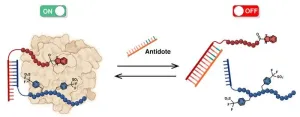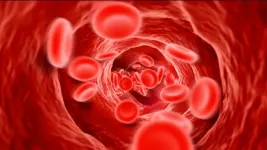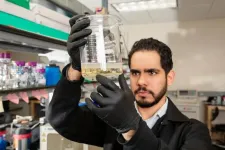(Press-News.org) PULLMAN, Wash. -- Researchers have discovered a new mechanism of oil biosynthesis and found a way to genetically engineer a type of test plant to more efficiently produce different kinds of seed oil that it otherwise wouldn't make.
While the engineering is proof-of-concept, this discovery could lead to improved production of valuable oils used in food and by a range of industries. The study, led by Washington State University researchers, was published in the journal Nature Communications.
“Scientists have been working on producing novel seed oil compositions for decades, but most of the time you only get small amounts of the desired oil,” said Phil Bates, a WSU professor and lead author on the study.
Bates and his co-authors found that Physaria fendleri, a plant related to canola, can naturally change the fatty acid composition in its seed oil after it is already made, something nobody knew any plant could do. They discovered the genetic mechanism Physaria uses to makes those changes, then genetically engineered a related plant called Arabidopsis to make the same fatty acid changes.
The modified Arabidopsis overcame metabolic bottlenecks and produced significant amounts of an oil similar to castor oil that it doesn’t naturally produce.
Plant oils are used in food, pharmaceutical, cosmetic, industrial, chemical and biofuel industries. Plant oils’ value stems from its fatty acid composition. Around 90% of oil is valuable for industrial uses in crops like castor beans, Bates said. But if the desirable oil-making genes are transferred into another plant, only small amounts of the oil produced is usable by industry. The newly discovered mechanism of oil biosynthesis shows a way to bump that production back up.
“We’ve always thought that when plants accumulate oil during seed development, that’s the end product,” said Bates, a faculty member in WSU’s Institute of Biological Chemistry. “But we found that Physaria, after making oil, removes some of the fatty acids within the oil and replaces that with others.”
Those oils could replace the reliance of growing dangerous crops, like castor. Castor plants are banned in the U.S. because they also produce ricin, a dangerous poison. Castor oil is valuable in industrial lubricants, but expensive because only a few nations can grow the plants, either legally or environmentally.
“We can use this new biosynthetic process as a tool to change oil composition,” Bates said. “We’re at the starting point of putting this into crop plants. We want to eventually produce healthy fatty acids beyond industrial uses.”
Bates and his colleagues are also looking at other plants to see if they do similar remodeling of oils after production.
“We haven’t identified any others yet, but we’ve never looked before,” Bates said. “This is a new discovery that nobody knew plants could do. We want to see if common crop plants, like canola, can do this remodeling as well.”
Other potential uses for this process include food for people and biofuels, especially aviation fuel.
The project was a collaboration between Bates lab and the Smertenko lab both in the Institute of Biological Chemistry at WSU as well as two labs from the U.S. Department of Agriculture.
Funding for work on this paper came from the USDA National Institute of Food and Agriculture, National Science Foundation and the U. S. Department of Energy.
END
Discovery of mechanism plants use to change seed oil could impact industrial, food oils
Scientists engineer plant to produce an oil it otherwise wouldn't make
2024-04-30
ELSE PRESS RELEASES FROM THIS DATE:
A new anticoagulant with no risk of bleeding
2024-04-30
Anticoagulant treatments are crucial for managing many conditions, such as heart disease, stroke and venous thrombosis. Current options, however, carry an inherent risk of serious bleeding due to trauma or unforeseen events. A team from the University of Geneva (UNIGE) and the University of Sydney has developed a new anticoagulant, designed to have an on-demand reversible activity, with a fast-acting ‘‘antidote’’. This approach could revolutionise the use of anticoagulants in surgery or other applications. The mechanism of activation and deactivation of the active principle ...
Genetic adaptations have impacted the blood compositions of two populations from Papua New Guinea
2024-04-30
Papua New Guinea (PNG) has a wide range of environments, each presenting unique challenges to human survival. Highlanders and lowlanders of PNG are striking examples of populations facing distinct environmental stress. Whereas the highlanders encounter low oxygen availability due to altitude, the lowlanders are exposed to specific pathogens that are absent in the highlands, such as malaria. Despite these strong environmental pressures, the specific adaptations of these populations have remained overlooked. A new study published in Nature Communications on Tuesday, 30 April 2024 sheds light on the genetic adaptations of Papua New Guineans in response to their unique environmental ...
Abrupt permafrost thaw intensifies warming effects on soil CO2 emission
2024-04-30
According to a recent study published in Nature Geoscience, scientists have found that soil carbon dioxide (CO2) emissions are more sensitive to climate warming in permafrost-collapsed areas than in non-collapsed areas.
This study, based on field warming experiments combined with laboratory incubation of soils from a large-scale sampling, provides new insights about permafrost carbon–climate feedback in the context of future climate warming.
Warmer temperatures have led to rapid permafrost thawing in high-latitude and -altitude permafrost regions. Abrupt permafrost thaw, ...
Scientists discover over 100 new genomic regions linked to blood pressure
2024-04-30
National Institutes of Health researchers and collaborators have discovered over 100 new regions of the human genome, also known as genomic loci, that appear to influence a person’s blood pressure. Results of the study also point to several specific genomic loci that may be relevant to iron metabolism and a type of cellular receptor known as adrenergic receptors.
The study, published in Nature Genetics, is one of the largest such genomic studies of blood pressure to date, including data from over 1 ...
Researchers identify over 2,000 genetic signals linked to blood pressure in study of over one million people
2024-04-30
The Queen Mary-led study reveals the most detailed picture yet of genetic contributors to blood pressure. The findings lead to improved polygenic risk scores, which will better predict blood pressure and risk for hypertension.
Researchers led by Queen Mary University of London and supported by the National Institute for Health and Care Research (NIHR) have discovered over a hundred new regions of the human genome, also known as genomic loci, that appear to influence a person’s blood pressure. In total, over 2,000 independent genetic signals for blood pressure are now reported, demonstrating that blood pressure is a highly complex trait influenced by thousands ...
Scientists find cancer-like features in atherosclerosis, spurring opportunity for new treatment approaches
2024-04-30
Researchers have discovered that the smooth muscle cells that line the arteries of people with atherosclerosis can change into new cell types and develop traits similar to cancer that worsen the disease. Atherosclerosis is characterized by a narrowing of arterial walls and can increase risk of coronary artery disease, stroke, peripheral artery disease, or kidney disorders. The findings, supported by the National Institutes of Health (NIH), could pave the way for the use of anti-cancer drugs to counteract the tumor-like mechanisms ...
A virus could help save billions of gallons of wastewater produced by fracking
2024-04-30
EL PASO, Texas (April 30, 2024) – An estimated 168 billion gallons of wastewater — or produced water — is generated annually by the Permian Basin fracking industry, according to a 2022 report by the Texas Produced Water Consortium. The major waste stream has proved both difficult and costly to treat because of the chemical complexity of the water.
In a new study published in the journal Water, researchers at The University of Texas at El Paso have identified a novel means of treating the wastewater generated by oil and gas production: bacteriophages.
Ramón Antonio Sánchez, a doctoral candidate within UTEP’s chemistry ...
MSD joins the Open Targets consortium
2024-04-30
Open Targets, a public-private partnership dedicated to pre-competitive drug discovery research, today announced MSD, the tradename of Merck & Co., Inc., Rahway, N.J., USA, as the latest partner to join the consortium. Open Targets aims to accelerate the development of safe and effective medicines by leveraging cutting-edge technologies to identify, prioritise, and validate potential drug targets. MSD’s expertise in drug discovery will complement the strengths of the current partners: EMBL’s European Bioinformatics Institute (EMBL-EBI), the Wellcome Sanger Institute, GSK, Sanofi, Pfizer, and Genentech, ...
U of T researchers target neurogenesis in new approach to treat Parkinson’s disease
2024-04-30
Researchers at the University of Toronto have found a way to better control the preclinical generation of key neurons depleted in Parkinson’s disease, pointing toward a new approach for a disease with no cure and few effective treatments.
The researchers used an antibody to selectively activate a receptor in a molecular signaling pathway to develop dopaminergic neurons. These neurons produce dopamine, a neurotransmitter critical to brain health.
Researchers around the world have been working to coax stem cells to differentiate into dopaminergic ...
Microbiome researchers challenge the state of the art in colon cancer biomarker discovery
2024-04-30
Leuven (Belgium) 30/04/2024 - For the first time, researchers from VIB-KU Leuven, UZ Leuven, Janssen Pharmaceutica and multiple international collaborators have introduced quantitative methods and extensive confounder control to discover microbiome biomarkers in colorectal cancer development. While multiple microbial taxa have been put forward as potential cancer-associated biomarkers in the past, this new study uncovers obscured contributions that may have resulted in incorrect associations. The results have been published in Nature Medicine.
Cancer ...
LAST 30 PRESS RELEASES:
Novel camel antimicrobial peptides show promise against drug-resistant bacteria
Scientists discover why we know when to stop scratching an itch
A hidden reason inner ear cells die – and what it means for preventing hearing loss
Researchers discover how tuberculosis bacteria use a “stealth” mechanism to evade the immune system
New microscopy technique lets scientists see cells in unprecedented detail and color
Sometimes less is more: Scientists rethink how to pack medicine into tiny delivery capsules
Scientists build low-cost microscope to study living cells in zero gravity
The Biophysical Journal names Denis V. Titov the 2025 Paper of the Year-Early Career Investigator awardee
Scientists show how your body senses cold—and why menthol feels cool
Scientists deliver new molecule for getting DNA into cells
Study reveals insights about brain regions linked to OCD, informing potential treatments
Does ocean saltiness influence El Niño?
2026 Young Investigators: ONR celebrates new talent tackling warfighter challenges
Genetics help explain who gets the ‘telltale tingle’ from music, art and literature
Many Americans misunderstand medical aid in dying laws
Researchers publish landmark infectious disease study in ‘Science’
New NSF award supports innovative role-playing game approach to strengthening research security in academia
Kumar named to ACMA Emerging Leaders Program for 2026
AI language models could transform aquatic environmental risk assessment
New isotope tools reveal hidden pathways reshaping the global nitrogen cycle
Study reveals how antibiotic structure controls removal from water using biochar
Why chronic pain lasts longer in women: Immune cells offer clues
Toxic exposure creates epigenetic disease risk over 20 generations
More time spent on social media linked to steroid use intentions among boys and men
New study suggests a “kick it while it’s down” approach to cancer treatment could improve cure rates
Milken Institute, Ann Theodore Foundation launch new grant to support clinical trial for potential sarcoidosis treatment
New strategies boost effectiveness of CAR-NK therapy against cancer
Study: Adolescent cannabis use linked to doubling risk of psychotic and bipolar disorders
Invisible harms: drug-related deaths spike after hurricanes and tropical storms
Adolescent cannabis use and risk of psychotic, bipolar, depressive, and anxiety disorders
[Press-News.org] Discovery of mechanism plants use to change seed oil could impact industrial, food oilsScientists engineer plant to produce an oil it otherwise wouldn't make









